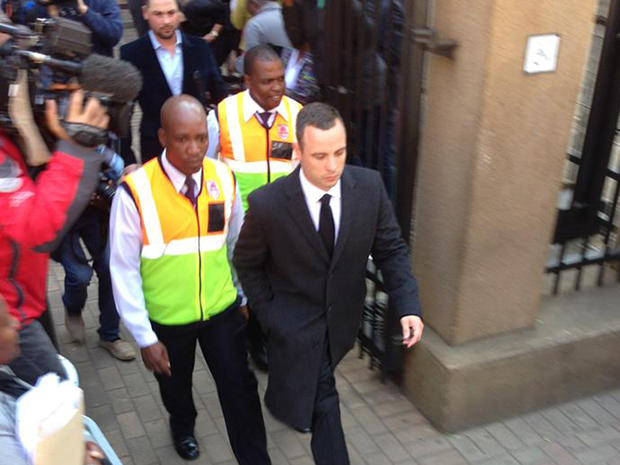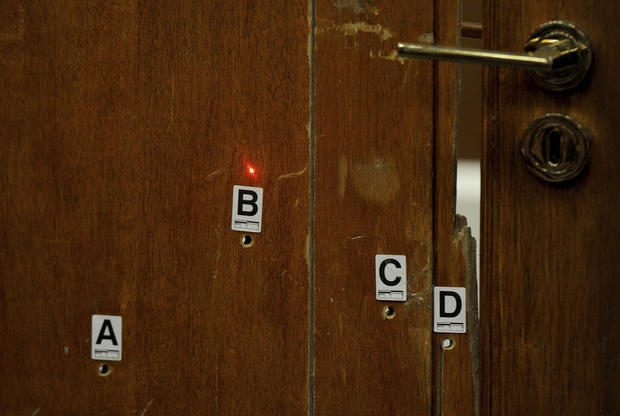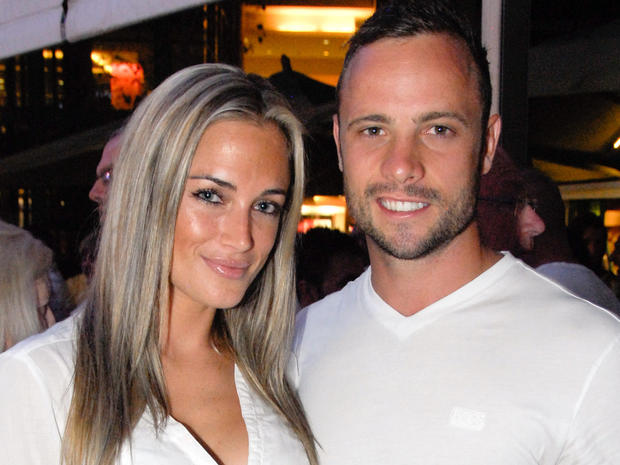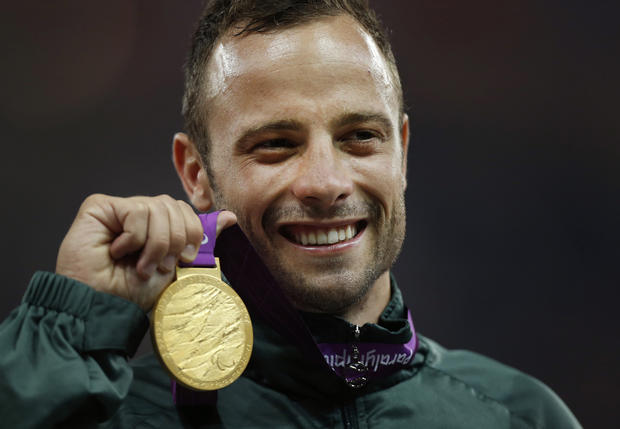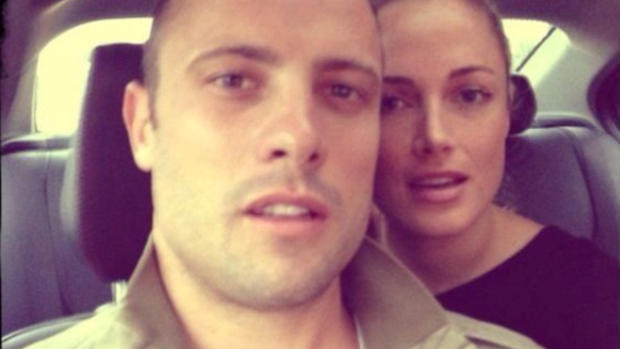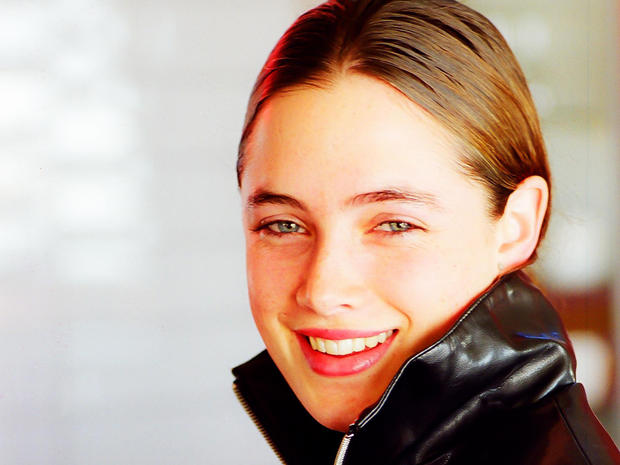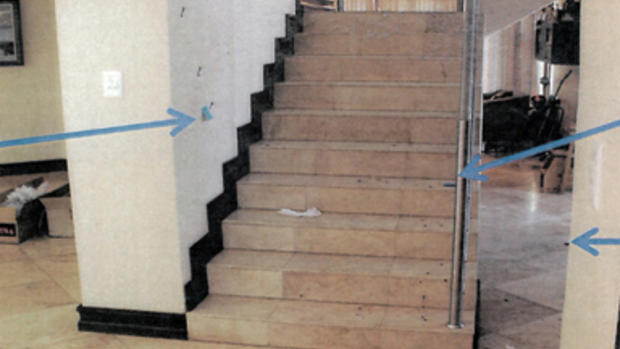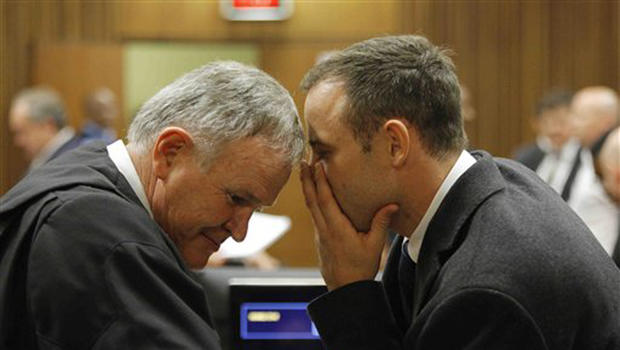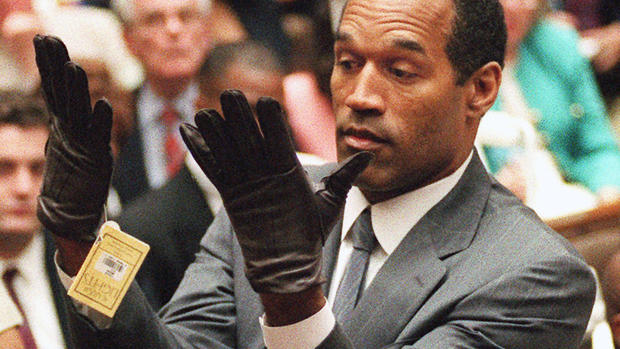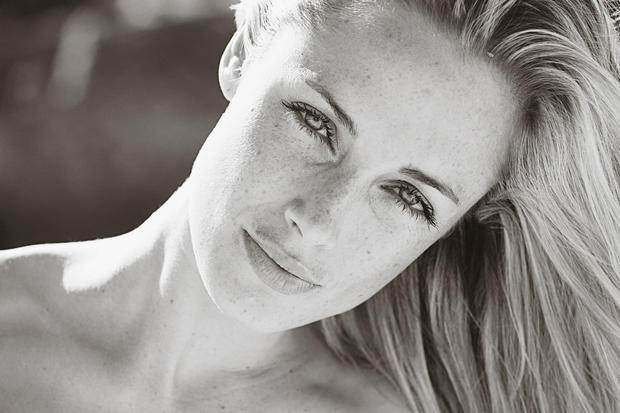Oscar Pistorius: Shots in the Dark
Produced by James Stolz, Kim Kennedy, Marcie Spencer, Patti Aronofsky, Sarah Carter, Taigi Smith and Avi Cohen
(CBS NEWS) -- The riveting drama unfolding in a Pretoria, South Africa, courtroom has been building for over three months.
The nation of Nelson Mandela is familiar with heartache and heroes, but this is the tale of a different kind of hero. And The High Court is awash in controversial testimony and raw unfiltered emotion.
It has been an Oscar Pistorius no one could imagine.
Oscar Pistorius: Before I knew it, I fired four shots at the door.
The legendary "Blade Runner," an example of courage to the world, is accused of the Valentine's Day 2013 murder of his stunning girlfriend, Reeva Steenkamp.
Gerrie Nell: You killed a person, that's what you did, isn't it?
Oscar Pistorius: I made a mistake.
Gerrie Nell: You killed Reeva Steenkamp, that's what you did!
Pistorius, 27, chose not to have his testimony on camera while being grilled by prosecutor Gerrie Nel.
In court, the champion defeated, sobbing like a child.
"It was unbelievable because he was a hero to so many people," said Mark Seal, of Vanity Fair Magazine.
Seal, a "48 Hours" consultant, has written about the trial of Oscar Pistorius that is captivating the world.
- Read more: Mark Seal's Vanity Fair article
"It has everything. It has drama, two young attractive people, the gun culture of South Africa, and, of course, Oscar Pistorius, Olympic hero," said Seal.
Jen Su, a South African talk show host and friend of Oscar and Reeva's, believes Pistorius is innocent.
"The trial has been all consuming for everybody in South Africa," Su said. "It's difficult because I'm with friends and they strongly disagree with me. They think he's guilty as sin and we have arguments over this."
Daily, the trial -- the first-ever televised court case in South Africa -- spills out of the courtroom, into the headlines and hearts of South Africa.
"For some he'll always be Oscar Pistorius, the hero. But for others, he's Oscar Pistorius, the killer," said Seal.
Mike Azzie, a man who is like a second father to Pistorius -- who Oscar remains close to -- is speaking out for the first time on American television.
"Oscar is not a cold-blooded murderer," Azzie told CBS News correspondent Debora Patta. "And he's got lots and lots of love behind him and we just hope that he can remain strong."
What's dead certain is this: the "Blade Runner" is in the race of a lifetime.
"The stakes couldn't be much higher in this case," said Seal.
Oscar Pistorius' fate will be decided by Thokozile Masipa -- both judge and jury under South African law. She must determine what really happened in the early hours of Valentine's Day.
Pistorius lay in bed next to Steenkamp, the 29-year-old model and reality TV star he had only recently started dating.
Oscar Pistorius: I got a fright from a noise I heard ... I perceived somebody was coming to attack me.
"So he grabs his gun and rushes to the bathroom where he thinks the intruder is hiding and he starts firing," Seal explained. "There's no intruder in the bathroom. It's Reeva in the bathroom. ...Four shots. Three of which hit Reeva Steenkamp."
Accident or murder? Since his arrest, Pistorius has stuck to his story.
Oscar Pistorius: I didn't have time to think. I discharged my firearm.
Four shots through the bathroom door, which now sits like some hideous monument in the courtroom, as a nation awaits judgment day for one of its greatest heroes.
"The question is why did he do it? The question is what happened that night. The question is what's the truth about Oscar Pistorius when he picked up that gun and started firing into the bathroom? Seal said. "That's the question."
OSCAR AND REEVA
Reeva Steenkamp and Oscar Pistorius seemed like the kind of couple dreams are made of.
"People saw them and thought, 'Wow, they're so attractive,'" Vanity Fair writer Mark Seal said. "They were like stars."
"It was the story of a man who overcame incredible disability ... and then met an incredibly talented and beautiful woman. Fell in love. And then tragedy struck," said friend Jen Su.
The tragedy runs so deep because Oscar Pistorius ran against the wind from his birth in 1986. He ran so fast, came so far. Pistorius was born without fibula bones.
"When I was 11 months old I had both legs amputated. And then when I was 13 months old I got my first pair of walking legs," Pistorius told Sky TV in a 2004 interview.
His "walking legs" would soon take Oscar around the world. But the inspiration started with his mother, Sheila, who set the tone that allowed her child to become a champion. Years later, Pistorius shared the memory with Jay Leno.
"My mother just said to me in the mornings you know, 'Oscar you put on your prosthetic legs. The last I wanna hear about it. You know there's no disability in our family,'" he said.
"His mother ... told him that the real loser is not the one who crosses the finish line last, the real loser is the one who sits on the side and doesn't try to compete," said Seal.
"She became ill and she passed on suddenly," said Mike Azzie.
With his mother gone and estranged from his dad, 15-year-old Oscar turned to Azzie as a father figure.
"He's always been a wonderful boy," said Azzie.
To Oscar, he's Uncle Mike.
"There's never a conversation that's ever ended without one of the parties saying, 'I love you,'" said Azzie.
Nearly 9,000 miles away from South Africa, in Fort Smith Arkansas, "48 Hours" found a man who knew Oscar Pistorius before he became an international icon.
"He was around 14 years old ... and he was jumping over hurdles," Francois Van Der Watt told "48 Hours" correspondent Peter Van Sant. "I was like 'Why would you do that?' And he was just, 'There's no why not?'"
Van Der Watt, back then living in South Africa, sensed the determined boy needed better than his battered legs.
"He was wearing what we call exoskeletal prosthetics, which is pretty much wooden prosthetics," he explained. "Very primitive."
Together, Van Der Watt and Pistorius decided to give Oscar the legs to match his heart -- the wings he needed to fly. They called them "blades."
"There's no science behind it. It was kind of a trial and error," Van Der Watt said. "Our first day," he said, showing Van Sant a photo. "The first time we tried the running legs."
"Were you impressed with this young man?" Van Sant asked.
"Absolutely," Van Der Watt replied. "He wanted to be fast. He wanted to be a runner."
Oscar Pistorius took off.
"God had a plan when he gave me these legs, and at the end of the day I'm happy. I don't think I would be doing athletics if I was able bodied. I don't see myself as disabled," a young Pistrious said in a Sky TV interview.
The "Blade Runner" was born. The world had never seen anything like it.
"He became half man, half machine, with the gait of a cat," Seal said. "And was able to run on these blades, and not only run, but to win."
Pistorius would win races around the world and became an iconic symbol to his country -- and to the disabled community everywhere.
"He set the track on fire. It was the most amazing thing," Samkelo Radebe told Patta.
Radebe, who lost his hands in an electrical accident, was Pistorius' teammate.
"He was never a star in the team, but he was just one of us," he said. "He's just one of the teammates."
London 2012 marked achievements like no other.
"This was history," Van Sant noted.
"That's it, yeah," said Van Der Watt.
Pistorius and Radebe competed in the Paralympic Games for the disabled and won gold.
"All of us were hugging," said Radebe of the win.
There was also a very different type of victory -- a legal one.
"This day's gonna go down in the history for the equality for disabled people," said Pistorius at a press conference.
The little boy with no legs won the right to compete in the Olympic Games against the best able-bodied athletes in the world.
"When he's on that running track at the Olympics ... that says it all. It says 'I'm here. I've overcome these odds,'" said Seal.
While he didn't win an Olympic medal, the world crowned Oscar Pistorius 100-percent champion.
"And it's such a blessing this experience for me," Pistorius said. "I've learned a lot, and just being able to come out here and represent my country has been very, very humbling for me..."
But in the swirl of international attention, staying humble was a challenge for Oscar Pistorius, superstar. From "The Tonight Show" to commercials, "Everywhere you looked it was Oscar, Oscar Oscar!" said Seal.
Beautiful and smart, model and aspiring actress Reeva Steenkamp was part of the celebrity society Pistorius had run his way right into.
"And everybody just said, 'Wow, you know. Who is that? Who is that woman?'" said Seal.
Modeling was now leading to a reality TV show. Steenkamp modeled from age 14, but she would also study law. She was ambitious, compassionate and politically aware.
"It was ironic that she died at the hand of a man with a gun, because she and her mother were longtime advocates of women suffering violence and domestic abuse," said Seal.
Just four days before she was shot dead, Steenkamp was tweeting:
"She wanted to become one of the activists for women and empowerment," said Steenkamp's publicist, Simphiwe Majola.
Majola witnessed her passion for the rights of young women.
"If they're empowered with education they're able to face challenges like abuse, domestic violence," she said.
Gina Myers and Reeva became roommates and best friends.
"She is the most amazing human being,' Myers said."Everything about her. Her belief system. Her -- the integrity she had."
"She was a rising star of tremendous magnitude," Seal said.
Just like Oscar Pistorius.
It wouldn't take long for the two supernovas to find each other.
"Oscar's a very, very sexy boy," Reeva said on a red carpet interview. "But he doesn't do it in an arrogant, obnoxious way. ...he's a gentleman."
"He was definitely in love," said the couple's friend, Jen Su.
But where some saw a magical couple, others saw an Oscar Pistorius changed by fame.
"People said he went from the humble, friendly loveable Oscar to Oscar the Invincible. Like, 'I'm Oscar Pistorius. The world owes me,'" said Seal.
"He was always still the same Oscar that I knew in the first time I met him," said Van Der Watt.
Except for one crucial thing; Pistorius was now afraid, not of the competition on the track, but of the crime celebrity can attract.
"When I visited him and stayed in his house, and he turns on the alarm system, and he tells me ... 'I'm sleeping with my 9 millimeter next to my bed," said Van Der Watt.
"With his gun?" Van Sant asked.
"With his gun, yes," Van Der Watt replied.
Two weeks before Oscar Pistorius shot Reeva Steenkamp to death the glittering couple had dinner with their good friend Jen Su.
"We had a great, great night 101," Su said. "Oscar was just different with Reeva ... Reeva was for keeps."
THE CASE AGAINST PISTORIUS
Gerrie Nel: You armed yourself you're ready to shoot.
Oscar Pistorius: M'lady I believe there was a threat that was on my life.
"Pistorius is running on a track he has never run on before," defense attorney and CNN legal analyst Mark O'Mara told "48 Hours".
Gerrie Nel: You shot four shots through that door. Knowing that she was standing behind the door ... you killed Reeva and you're the only person that can give us a version of what happened.
"Pistorius is running on a track he has never run on before," O'Mara said. "Now he's a defendant in a case where he can go away for the rest of his life."
Gerrie Nel: I'm putting it to you Mr. Pistorius that your version is not only untruthful, but it's so improbable that it cannot be reasonably possibly true.
Oscar Pistorius faces his toughest opponent yet, the unrelenting prosecuting attorney Gerrie Nel.
"He is now in Nel's courtroom," said O'Mara, who successfully defended George Zimmerman for the fatal shooting of Trayvon Martin.
Gerrie Nel: You're not unsure, you know for a fact.
"He's a bulldog," O'Mara continued. "That's his nickname. And he's earned it well throughout many, many, many trials."
Unlike the American jury system, all arguments and responses in a South African court are directed to one person.
"Everyone who speaks in a courtroom is to speak to the judge. So you'll hear them say, 'M'lady,'" said O'Mara.
The "M'lady" is Judge Thokazile Masipa. A child of apartheid, Judge Masipa became a social worker, then a crime reporter, a lawyer, and is now a judge in The High Court.
"She is known to be a difficult sentencer," said O'Mara.
Ferial Haffajee is editor of Johannesburg's City Press newspaper.
"I love how she sits and listens quietly," Haffajee observed. "You get the sense that she's going to completely apply her mind when she eventually does write what's probably going to be the judgment of her life."
That judgment will depend in part on Nel's ability to show that Pistorius' story about shooting at a would-be intruder is a lie.
Oscar Pistorius: I fired at the door M'lady.
Gerrie Nel: No, listen to my question Mr. Pistorius.... You fired at Reeva. The other versions of yours cannot work.
As Reeva's family watched closely, Nel set out to prove that Pistorius and Steenkamp were actually having a heated argument that night.
Nel opened his case with Pistorius' neighbors, who testified to what they heard:
Estelle Van de Merwe: M'lady, I woke up around 1:56 in the morning ... it seemed like somebody was involved in a fight.
Annette Stipp: M'lady the screams that I heard was petrified. The female screams. Just before the gunshots.
Michelle Berger: ... it was blood curdling. ... It was something that leaves you cold.
"Those witnesses were talking about death screams," O'Mara said. "If they are to be believed, then it's murder. Period."
Gerrie Nel: You come from a family with lots of guns, am I right?
Oscar Pistorius: That's correct.
Gerrie Nel: Fifty or more I read somewhere.
Prosecutor Nel established what he called Pistorius' preoccupation with and reckless use of guns. He played video in court of Oscar shooting a watermelon.
Pistorius' friend, Kevin Larena, testified to an incident when he accidentally fired a gun in a crowded restaurant.
"I do remember Oscar saying, 'please' to Darren, 'just say it was you. I don't want any attention around me, just say it was you," he told the judge.
Pistorius denies shifting the blame.
Then Pistorius' ex-girlfriend, Samantha Taylor, described another incident with a gun in Oscar's car after they were pulled over by police.
"Oscar got very angry," Taylor testified. "About two minutes after I saw Oscar take his gun and shoot out of the car roof."
Pistorius denied that, too.
"Shooting a gun is a very empowering activity ... It's also a very potent way of (snaps) explosively solving a problem," Dr. Alexander Sasha Bardey, a forensic psychiatrist. "That also shows a propensity to reach for a gun when ... he's not feeling that he's getting his way."
After 12 days and 15 witnesses for the prosecution, the most important piece of evidence would be the bathroom door ... a silent witness showing the placement of the four bullets fired from Pistorius' gun.
The prosecution contends that during her argument with Pistorius, Reeva ran into the bathroom and locked the door. Oscar, in a rage, grabbed his pistol from under the bed, followed her without his prosthetic legs to the bathroom, and fired into the door.
Prosecution ballistics expert Captain Chris Mangena demonstrated his theory about how each bullet struck Steenkamp.
"She was standing in front of the door facing the door," he testified. "The bullet penetrated and broke the hip bone of the deceased."
He says the first hit her in the hip, knocking her backward. "From that position, she fell down."
Pistorius then paused before firing a second shot which missed, ricocheting off the wall injuring Reeva in the back as she fell into a defensive position.
"And she was a bit facing down," said Mangena.
A third and fourth shot followed, hitting her in the arm and head.
"How critical was the ballistics evidence?" CBS News correspondent Debora Patta asked Dr. David Klatzow, who specializes in forensic science.
"It's absolutely vital to the prosecution case," he replied. "Now it's absolutely crucial that the state can show not only that that was a sequence ... but that there was a delay in the shooting."
"Why is that delay important?" Patta asked.
"Because it then can be argued that Reeva, after the first shot in the hip, would have cried out, thus dispelling any notion that Oscar would have had, of it being an intruder," Dr. Klatzow replied.
A cry which would be consistent with what Pistorius' neighbors' said they heard:
Gerrie Nel: You fired at Reeva. These other versions of yours can not work.
Oscar Pistorius: (sobbing) Not true M'lady.
Gerrie Nel: You fired at her. You did.
Oscar Pistorius: (crying) I did not fire at Reeva!
When prosecutor Nel cross-examined Pistorius, he showed little concern for the defendant's weeping and vomiting on the stand:
Gerrie Nel: Take responsibility for what you've done, Mr. Pistorius.
Oscar Pistorius: M'lady, I've taken responsibility but I will not look at a picture where I am tormented by what I saw and felt that night. I remember, I don't have to look at a picture, I was there!
Gerrie Nel: It's the same thing as the watermelon. The same happened to Reeva's head, it exploded.
During those days of intense questioning, a claim of self-defense evolved into a story of an accidental shooting:
Gerrie Nel: Did you fire deliberately?
Oscar Pistorius: No M'lady, I did not fire deliberately.
Gerrie Nel: You still with accidentally?
Oscar Pistorius: I didn't mean to pull the trigger so in that sense it was an accident, M'lady.
"An accident can explain one gunshot," O'Mara said. "But four gunshots, quite honestly, seems to be intentional when you can put them all at the same level and all into the same door."
"He's denied things that are undeniable, which has damaged his credibility," said Klatzow.
Gerrie Nel: Do you remember firing at the door?
Oscar Pistorius: Yes I remember firing at the door.
Gerrie Nel: Why didn't you? Yesterday when we ended you said you don't, you can't remember.
One of the last witnesses for the prosecution was Reeva Steenkamp. Her words from text messages to Pistorius, read by a police detective, were sent just weeks before she was killed:
"You have picked on me incessantly ... I'm the girl who fell in love with you".
"Those text messages were very haunting to me," said Haffajee.
"You do everything to throw tantrums in front of people ...I'm scared of you sometimes and how you snap at me."
"The Reeva that we hadn't seen until then was the terrified, insecure, not-in-a-happy relationship Reeva," said Haffajee.
"I can't be attacked by outsiders for dating you...And be attacked by you. The one person I deserve protection from."
DEFENDING OSCAR PISTORIUS
Gerrie Nel: "You killed her, you shot and killed her... take responsibility for what you've done, Mr. Pistorius..."
Oscar Pistorius: (heavy sobbing) I've taken responsibility, but I will not look at a picture where I'm tormented by what I saw and felt that night. As I picked Reeva up, my fingers touched her head. I remember and I was there.
"What happened was a tragedy. No one will ever know what was the cause of it or how it happened ... and he feels the family's pain," family friend Mike Azzie told CBS News correspondent Debora Patta. "He genuinely feels pain for her family."
Oscar Pistorius: I would like to take this opportunity to apologize to Reeva's family ...
"...but with all the people glaring at him in the courtroom and everyone wanting the worst for him---society is a cruel place," Azzie continued.
"It's going to go down as one of the most expensive defenses in criminal law history in South Africa," said defense attorney Renier Spies.
Spies says Oscar Pistorius' dream team defense lawyer, Barry Roux, is a seasoned litigator. "Barry Roux is regarded as one of the best," he said.
Barry Roux to witness: ...there's no way that even standing on the balcony, that you would have been able to hear screams.
Barry Roux: Do you having a difficulty sleeping?
Oscar Pistorius: I do M'lady. I wake up and I smell blood.
The defense says there is no evidence the couple argued that night, denying the prosecution's claims that Pistorius murdered Reeva Steenkamp in a fit of rage.
Barry Roux: Was the crying soft, loud?
Neighbor: The crying was like (mimics a wailing cry)
Neighbor: I heard her petrified screaming sometime during the gunshots and just after the gunshot.
Neighbors testified they heard crying and screaming. They re-enacted what they heard, but was it Reeva?
"That fact was so devastating to the defense until Oscar Pistorius testified," said Joe Tacopina, a defense attorney, who has represented many high-profile clients like New York Yankee Alex Rodriguez. He believes the sound of Oscar's voice in court helps to raise reasonable doubt.
"...when he testified in heightened tones, in excitable tones ... you heard what appeared to be a feminine voice," Tacopina explained. "...and it was clear that someone could easily, easily take that for a woman's high pitched screams ... so all of a sudden that testimony which seemed damning to Pistorius has been minimized substantially..."
Prosecutors have more problems. Lead detective Hilton Botha was booted from the case after he was slapped with attempted murder charges in an unrelated incident. And his team botched the crime scene and mishandled the bullet-riddled door.
"...when the most important piece of evidence in this case, aside from the body, is detached, taken away ... is trampled on ... its mind boggling and it leaves room for the defense to punch a hole through the evidence in this case," said Tacopina.
Defending Oscar Pistorius has not been easy. Attorney Barry Roux has had to strike a delicate balance between emotion and reasonable doubt. With no jury, Pistorius can only hope the woman whose opinion matters most, Judge Masipa, will believe his story.
Oscar Pistorius: ...we sat at the dining room table for a while and we chatted about my day.
According to Pistorius, he and Reeva went to bed between 9 and 10 p.m. He says he woke up in the early morning hours of Valentine's Day to bring in a fan from his terrace.
Oscar Pistorius: It was at this point that I heard a window open in the bathroom.
Barry Roux: What did you think at that time Mr. Pistorius?
Oscar Pistorius: (crying) M'lady, that's the moment that everything changed. I thought there was a burglar that was gaining entry into my home.
Pistorius says he grabbed a gun he keeps under his bed. It was dark and, remember, he wasn't wearing his prosthetic legs. Armed and walking on his stumps, Oscar says he made his way to the bathroom and shouted to Steenkamp to call the police:
Oscar Pistorius: (crying )...and then I heard a noise inside from inside the toilet. ...Before I knew it I'd fired four shots at the door. My ears were ringing, I couldn't hear anything.
After firing four shots, he put on his prosthetic legs.
Oscar Pistorius: I was crying out for the Lord to help me, I was crying out for Reeva, I was screaming...
He kicked the door and hit it with his cricket bat. Then, Pistorius says, he opened the door and discovered Steenkamp.
Oscar Pistorius: (sobbing) ... and I sat over Reeva and cried. And um, I don't know, I don't know how long, I don't know how long I was there for (breaks down sobbing). She wasn't breathing.
"At first glance Oscar Pistorius' story sounds ridiculous," Tacopina said. "But you have to step back and realize there's context that we need to put in to the Oscar Pistorius story and his version of events..."
Barry Roux: Have you even been a victim to crime?
Oscar Pistorius: Yes, I have. My home had been broken into in 2005 ... I've been followed home late at night.
"...Oscar has always been fearful of that -- he was always looking over his shoulder," Azzie explained. My son lived at his house one night ... and Oscar came running up with a gun in his hand. And my son said, 'It's me Oz' and ... and then Oscar said, 'Boy, you must be careful because I sleep with a gun under my pillow.'"
Perhaps the way to understand Oscar's defense is to understand South Africa.
"Almost everybody in South Africa has a war story to tell you," said newspaper editor Ferial Haffajee.
It is a country with one of the highest rates of violent crime in the world.
"It's hard I think for Americans to comprehend the levels of crime. Oscar lived in fear. He had high security.... Help us understand why that is. Why so much fear?" Patta asked Haffajee.
"If I leave work late ... the drive home ... I look a bit like I'm in a movie," she replied. "You make sure your doors are locked. You don't stop at the red light. You go through it. ...I see signs saying, 'Hijacking hot spot' ... it's part of, of how we live, it's the way most South Africans live."
Pistorius' fear for his safety would become the dramatic turning point. A defense expert would testify about Oscar's state of mind and reveal a stunning diagnosis.
"Mr. Pistorius has a long history of generalized anxiety disorder. It appears to have been increasing with time," Dr. Merryll Vorster, a psychiatrist, told the judge.
"Generalized anxiety disorder is a recognized diagnosis," said Dr. Alexander Sasha Barday, a forensic psychiatrist. "It doesn't cross the line in terms of your ability to distinguish reality from fantasy ... it's a diagnosis that makes you worry a lot."
After more than 30 days of testimony, the judge would suspend the trial and order Oscar Pistorius to undergo a psychiatric evaluation.
"This anxiety thing could certainly help his case, most definitely," Spies said. "And if that condition existed at the time of the incident, you cannot judge me by the same measure you would judge a reasonable man under those circumstances."
Four mental health experts are now almost through examining Pistorius and will give their medical evaluation.
"... if by some chance ... Oscar Pistorius has a heightened sense of anxiety, he has an anxiety disorder, this case is over. He will walk. He will be found not guilty. Not liable. But the odds of that happening are slim to none," said Tacopina.
COMPARISONS TO THE O.J. SIMPSON TRIAL
Twenty years ago, the fate of another sports star accused of murder riveted the United States.
After learning police were going to arrest O.J. Simpson for the murder of his ex-wife, Nicole Brown Simpson, and her friend, Ron Goldman, Simpson fled in the back of his white Bronco down a California freeway
"You have crowds forming and they're going crazy -- screaming encouragement to the Bronco," Vanity fair writer Lilli Anolik said. "The networks across the country are interrupting ... to air the footage ...and people were just glued to their TV screens.
"And he's an American hero ... Heisman Trophy winner, Football Hall of Famer, movie star,'" Anolik continued. "And this guy is in the middle of a freefall. And they whole country is watching to see if he's gonna go splat ... As far as drama goes, you kinda can't beat it."
Ninety-five million people watched that Bronco chase. Harvard Law Professor Alan Dershowitz was one of them.
"I was watching the NBA playoffs and was furious that [they] switched away to watch this stupid chase," Dershowitz told "48 Hours" correspondent Troy Roberts.
Later, Dershowitz would join O.J. Simpson's defense team. But on June 17, 1994 he was just irritated.
"I couldn't believe America was so transfixed with this event on television, but they were," he said.
A similar phenomenon is going on now in South Africa. There's a 24-hour TV channel devoted to the Pistorius trial; viewers can't get enough. They call it the "Oscar effect." When the trial is on, worker productivity goes down. Barry Roux and Gerrie Nel have become household names. They are as famous as the legendary dream team that represented O.J. Simpson in America.
"It wasn't a dream team," Dershowitz said. "They didn't get along. There was too much ego involved. It was anything but a dream team."
In spite of their differences, the strategy was clear:
Johnnie Cochran: What they've done to our client is wrong...
"We didn't win this case. The police and prosecutors lost it. We helped them lose it," said Dershowitz.
They were ably assisted by the Los Angeles Police Department detectives investigating the case, in particular, Mark Furhman.
"Mark Fuhrman was a classic racist," said Dershowitz.
And prosecutor Marcia Clark knew it, Dershowitz says, long before she called Fuhrman to the stand.
"They knowingly walked into this trap, and we pulled the lever," he said.
F. Lee Bailey: You say on your oath that you have not addressed any black person as a "nigger".
Mark Furhman: That's what I'm saying.
Johnnie Cochran: He's a lying, perjuring genocidal racist.
In South Africa, the Pistorius defense team has tried to make an issue out of the alleged misdeeds of former lead detective Hilton Botha. And while Pistorius himself seems shy around the camera, O.J. Simpson enjoyed the spotlight. His star turn came when Assistant District Attorney Chris Darden asked him to try on the bloody glove.
"I was four feet away when Darden made the biggest blunder of a lawyer in the 20th Century. He could have had the glove tried on outside the presence of the jury to see if it fit. But he didn't. He was so arrogant he had him try it on in front of the jury," Dershowitz said. "He walked up to the jury and he basically said, 'It's too small.' ... and that became of course, the mantra of the case"
Johnnie Cochran: If the glove doesn't fit you must acquit.
But to the families of Nicole Brown Simpson and Ron Goldman the evidence against Simpson was overwhelming.
"I trusted the system. I was raised to believe that the halls of justice provided you with just that," said Goldman's sister, Kim, who has written an eBook, "Can't Forgive". "I feel like my anger is appropriate."
It's hard to forget her face when the verdict was read.
"I was really shocked. I felt betrayed. I felt disappointed, anger," she told Roberts.
150 million people watched Kim Goldman fall apart on national television. Outside the courtroom, a crowd erupted in cheers.
"I didn't understand that ... In my brains he committed a double homicide ... people wanted to you know hang out with him," Goldman said. "I think people were just in awe of him and couldn't believe that someone of a superhuman status could, you know, commit such heinous crimes."
"When the Oscar Pistorius story broke, what were you thinking?" Roberts asked.
"I thought, 'Uh oh, maybe we're having a repeat here,'" said Goldman.
Now, instead of talking about "The Juice", they're talking about "The Blade Runner". But, unlike the O.J. Simpson trial, there's no jury to impress with courtroom theatrics in South Africa.
"Do you envision a scenario where Oscar Pistorius will go home?" Roberts asked former Simpson dream team lawyer Robert Shapiro.
"I think it's highly unlikely," he replied.
Shapiro has made guest appearances on South African TV.
"I think the most likely outcome for this case is a conviction," he told Roberts. "When Oscar Pistorius took the witness stand he was confronted with inconsistent statements."
But while others talk about the Pistorius trial in relations to Simpson's, Shapiro won't. Alan Dershowitz, who has just written his autobiography, says that being one of the attorneys who defended Simpson hurt his law practice. The verdict divided the nation -- often along racial lines.
"The good thing is it started a national conversation, right?" Roberts asked Dershowitz.
"It started a national shouting match. I don't think it started a national conversation," he replied. "Everybody either knew he did it, or knew he didn't do it."
And O.J. Simpson, for his part, did nothing to quiet the noise. Months after the trial ended, he spoke with "48 Hours" correspondent Harold Dow:
Harold Dow: A lot of people are having a hard time accepting the verdict. What do you say to them?
O.J. Simpson: Well, you know, people of color have been in a sense victimized for years in the legal system ... we were always told that's the way it is and if you don't like it, go back to Africa. I say to them, if you don't like it, go back to Europe or go back to wherever. That's your problem."
And while on the surface it may not seem that there's a race card in the Pistorius case, Dershowitz says there is a big one being played.
"Namely, his essential defense is everybody in South Africa knows that white people like Pistorius are afraid of black people breaking into their house at night. And therefore, what he did was perfectly rational to a white person in South Africa. The problem is the judge is black ... you can't make that argument openly. You can only hint at it," he explained.
As for O.J. Simpson, a civil court jury did find him responsible for the deaths of Nicole Brown Simpson and Ron Goldman and awarded monetary damages. But Simpson never paid what he owed.
His freedom was short lived. In 2008, Simpson was sentenced to 33 years in prison after breaking into a Las Vegas hotel room, he says, for his sports memorabilia. Still, it's not nearly enough for Ron Goldman's sister.
"And what advice would you give to Reeva Steenkamp's family?" Roberts asked Goldman.
"Stay vigilant, stay active, stay present as much as you can. Keep your presence known. Keep her presence known," she replied. "She deserves that."
WHAT'S NEXT FOR PISTORIUS?
The courtroom drama begins again in two weeks. What the doctors and Judge Masipa decide will determine where Oscar Pistorius spends the rest of his life.
"If Oscar comes back and they find he's only slightly crazy, the question would be is he so crazy that he cannot assist in his own defense, and certainly from what we've seen that is not the case," said defense attorney Renier Spies.
Spies also points out the psychiatric evaluation of Pistorius will attempt to determine his mental state that Valentine's morning he shot Reeva Steenkamp. "The second question then, would be is he crazy to the extent where he had diminished capacity?"
In either case, the trial is likely to continue -- calling final witnesses and both sides presenting Judge Masipa with closing arguments, before her final deliberation begins.
Now Oscar Pistorius has nowhere to run.
"Oz has always been a fighter," Jen Su said. "So he's gonna get through this."
It was a journey only Oscar could imagine, now totally eclipsed by the size of his fall.
"The Oscar Pistorius that was a hero is gone forever," said Mark Seal.
"Well, both of them were really on the road to gold," Su said. "And now everything has been taken away."
Ironically, Steenkamp was becoming active in speaking out about violence against women.
"Be brave ... See the positive ... Make your voice heard" -- Reeva's own words from a speech she was to give at a girls school the Valentine's Day morning she died.
Read more: The advice Reeva Steenkamp never got to give
"I think the way you go out ... and make your exit is so important. You've either made an impact in a positive way, or a negative way,'" Reeva said on "Tropika Island of Treasure", the reality TV show in which she appeared. "But just maintain class and just always be true to yourself. And I'm gonna miss you all so much. And I love you very, very much (blows a kiss at the camera).
